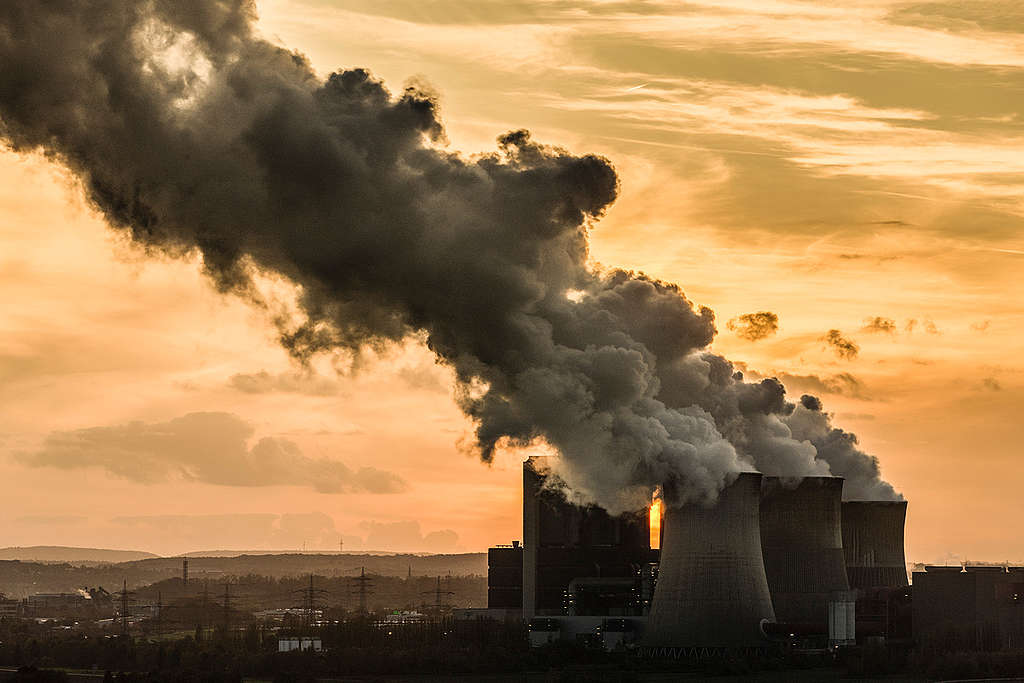Luxembourg, 27 January 2021 – New independent analysis [1] shows Luxembourg’s fund industry, the second largest in the world, continues to finance the global climate crisis. A report published by Greenpeace Luxembourg today shows that the country’s 100 largest investment funds, including funds from Blackrock, Goldman Sachs and JP Morgan, finance carbon emissions that could bring global warming to more than twice the limit set by the Paris Agreement, because the industry lacks any systematic consideration of climate criteria on its investment decisions. The assessment reveals a discrepancy between the country’s image campaign as a world-leading centre for sustainable finance and its blatant failure to adhere to the stipulations of its international commitments.
Conducted by two independent consulting firms on behalf of Greenpeace Luxembourg, the report exposes the climate impact of the 100 largest equity investment funds domiciled in Luxembourg [2], namely by assessing their carbon footprint, alignment with the climate objectives of the Paris Agreement and exposure to climate-related financial risks. The results show that the Luxembourg fund industry contributes significantly to the global climate emergency via the financing of unsustainable companies. Furthermore the funds have a considerable exposure to fossil-fuel reserves, especially coal, which is linked to high risks and potential financial losses in the short to medium term.
“Luxembourg has to become a leader in fighting the climate emergency as the second largest fund location in the world, and first in Europe,” said Jennifer Morgan, Executive Director of Greenpeace International.”The biggest contribution Luxembourg can make to the future of our planet is aligning its fund industry and its financial sector in general, with the limits set in the Paris Agreement to address global warming.”
The 100 largest Luxembourg-based funds emit on average 10% more greenhouse gases (GHG) than the MSCI World Index [3] used as a benchmark in the report. This means that funds domiciled in the Grand Duchy have companies in their investment portfolio that cause more GHG emissions compared to peer companies around the world. In 2019, the funds were responsible for the financing of 39 millions tons of GHG emissions [4], which amounts to four times the country’s national emissions. Besides fuelling the climate crisis, carbon-intensive assets expose funds to considerable financial risks.
“Our analysis shows that Luxembourg’s fund industry has a disproportionately high exposure to coal,” said Dr Martin Granzow, the author of the report. “Coal reserves are particularly problematic with regard to stranding risks, since in a <2°C scenario, there will have to be a far-reaching phase-out of coal-fired power generation until 2030 at the latest.”
If Luxembourg’s fund industry is to be viable and competitive in the future, financial executives and public policy makers need to implement measures to get the sector in line with the best available climate science to address climate-change related financial risks and market demand for sustainable investment solutions.
“The country’s political actors, who are all too eager to proclaim Luxembourg as a leading centre of sustainable finance, need to turn words into action,” said Martina Holbach, climate finance campaigner at Greenpeace Luxembourg. “We call on the government to introduce mandatory disclosure requirements and the systematic consideration of climate-related risks for the fund industry. Aligning the finance industry with the objectives of the Paris Agreement is both a necessity and an opportunity for the country.”
Notes to editors:
[1] The entire report “The impact of the 100 largest Luxembourg investment funds on climate change” is available here. A briefing summarising the main points is available here.
[2] based on the volume of assets under management
[3] The Morgan Stanley Capital International World Index is a free float-adjusted market capitalisation index that is designed to measure developed-market equity performance throughout the world.
[4] The report only addressed Scope 1 and Scope 2 emissions as reliable data for Scope 3 emissions is currently not available. As a consequence, GHG emissions financed by the funds are expected to be even much higher.

Au Luxembourg, l’argent de nos cotisations sociales finance la destruction de l’environnement et du climat.
